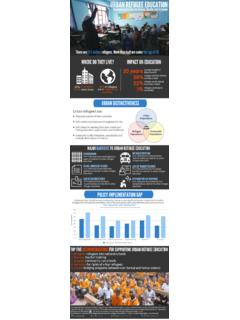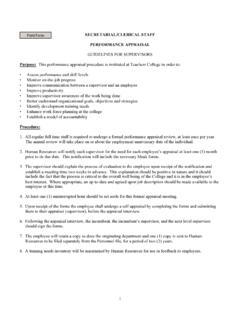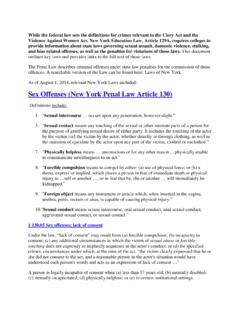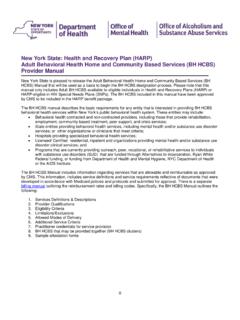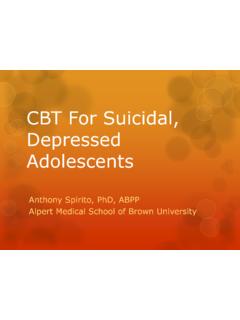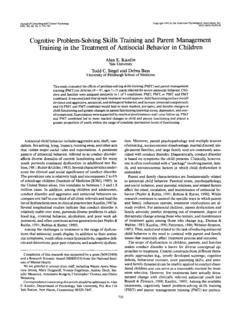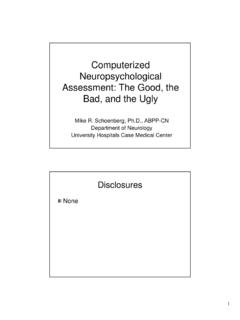Transcription of Loss, Trauma, and Human Resilience - Graduate School of ...
1 loss , trauma , and Human Resilience Have We Underestimated the Human Capacity to Thrive After Extremely Aversive Events? George A. Bonanno Teachers College, Columbia University Many people are exposed to loss or potentially traumatic derived from individuals who have experienced significant events at some point in their lives, and yet they continue to psychological problems or sought treatment, theorists have positive emotional experiences and show only minor working in this area have often underestimated and misun- and transient disruptions in their ability to function. Un- derstood Resilience , viewing it either as a pathological state fortunately, because much of psychology's knowledge or as something seen only in rare and exceptionally healthy about how adults cope with loss or trauma has come from individuals. In this article, I challenge this view by review- individuals who sought treatment or exhibited great dis- ing evidence that Resilience in the face of loss or potential tress, loss and trauma theorists have often viewed this type trauma represents a distinct trajectory from that of recov- of Resilience as either rare or pathological.
2 The author ery, that Resilience is more common than often believed, challenges these assumptions by reviewing evidence that and that there are multiple and sometimes unexpected Resilience represents a distinct trajectory from the process pathways to Resilience . of recovery, that Resilience in the face of loss or potential trauma is more common than is often believed, and that Point 1: Resilience Is Different From there are multiple and sometimes unexpected pathways to Recovery Resilience . A key feature of the concept of adult Resilience to loss and trauma , to be discussed in the next two sections, is its distinction from the process of recovery. The term recovery M ost people are exposed to at least one violent or connotes a trajectory in which normal functioning tempo- life-threatening situation during the course of rarily gives way to threshold or subthreshold psychopathol- their lives (Ozer, Best, Lipsey, & Weiss, 2003). ogy ( , symptoms of depression or posttraumatic stress As people progress through the life cycle, they are also disorder [PTSD]), usually for a period of at least several increasingly confronted with the deaths of close friends and months, and then gradually returns to pre-event levels.
3 Full relatives. Not everyone copes with these potentially dis- recovery may be relatively rapid or may take as long as one turbing events in the same way. Some people experience or two years. By contrast, Resilience reflects the ability to acute distress from which they are unable to recover. Oth- maintain a stable equilibrium. In the developmental litera- ers suffer less intensely and for a much shorter period of ture, Resilience is typically discussed in terms of protective time. Some people seem to recover quickly but then begin factors that foster the development of positive outcomes to experience unexpected health problems or difficulties and healthy personality characteristics among children ex- concentrating or enjoying life the way they used to. How- posed to unfavorable or aversive life circumstances ( , ever, large numbers of people manage to endure the tem- Garmezy, 1991; Luthar, Cicchetti, & Becker, 2000; Mas- porary upheaval of loss or potentially traumatic events ten, 2001; Rutter, 1999; Werner, 1995).
4 Resilience to loss remarkably well, with no apparent disruption in their abil- and trauma , as conceived in this article, pertains to the ity to function at work or in close relationships, and seem ability of adults in otherwise normal circumstances who are to move on to new challenges with apparent ease. This exposed to an isolated and potentially highly disruptive article is devoted to the latter group and to the question of event, such as the death of a close relation or a violent or Resilience in the face of loss or potentially traumatic events. life-threatening situation, to maintain relatively stable, The importance of protective psychological factors in healthy levels of psychological and physical functioning. A. the prevention of illness is now well established (Taylor, further distinction is that Resilience is more than the simple Kemeny, Reed, Bower, & Gruenewald, 2000). Moreover, absence of psychopathology. Recovering individuals often developmental psychologists have shown that Resilience is common among children growing up in disadvantaged Correspondence concerning this article should be addressed to George A.
5 Conditions ( , Masten, 2001). Unfortunately, because Bonanno, Department of Counseling and Clinical Psychology, Teachers most of the psychological knowledge base regarding the College, Columbia University, 525 West 120th Street, Box 218, New ways adults cope with loss or potential trauma has been York, NY 10027. E-mail: 20 January 2004 American Psychologist Copyright 2004 by the American Psychological Association, Inc. 0003-066X/04/$ Vol. 59, No. 1, 20 28 DOI: grief work (Stroebe & Stroebe, 1991). The conception of grieving as work originated in Freud's (1917/1957) meta- phoric use of the term to describe the idea that virtually every bereaved individual needs to review each single one of the memories and hopes which bound the libido .. to the non-existent object (p. 154). Theorists following Freud emphasized even more strongly the critical importance to all bereaved individuals of working through the negative thoughts, memories, and emotions about a loss (see Bonanno & Field, 2001).
6 As researchers began to devote more attention to the bereavement process, however, it became apparent that, despite the near unanimity with which mental health pro- fessionals endorsed the grief work perspective, there was a surprising lack of empirical support for such a view (Wort- man & Silver, 1989). What's more, recent studies that have directly examined the legitimacy of the grief work ap- proach have not only failed to support this approach but actually suggest that it may be harmful for many bereaved individuals to engage in such practices (see Bonanno &. George A. Kaltman, 1999). A more plausible alternative would be that Bonanno grief work processes are appropriate for only a subset of bereaved individuals (Stroebe & Stroebe, 1991), most likely those actively struggling with the most severe levels of grief and distress (Bonanno et al., 2001). experience subthreshold symptom levels. Resilient individ- The idea that grief work may characterize only the uals, by contrast, may experience transient perturbations in more highly distressed bereaved individuals ( , those normal functioning ( , several weeks of sporadic preoc- exhibiting either the recovery or chronic symptom trajec- cupation or restless sleep) but generally exhibit a stable tories) is further supported by data indicating that the trajectory of healthy functioning across time, as well as the practice of engaging a wide array of bereaved individuals capacity for generative experiences and positive emotions in grief counseling has proved remarkably ineffective.
7 (Bonanno, Papa, & O'Neill, 2001). The prototypical resil- Grief-focused interventions typically target both acute or ience and recovery trajectories, as well as chronic prolonged grief reactions as well as the absence of a grief and delayed disruptions in functioning, are illustrated in reaction ( , Rando, 1992). Two recent meta-analyses Figure 1. In the loss and trauma literatures, researchers have tended to assume a unidimensional response with little variability in possible outcome trajectory among adults exposed to potentially traumatic events. Bereavement the- Figure 1. orists have tended to assume that coping with the death of Prototypical Patterns of Disruption in Normal a close friend or relative is necessarily an active process Functioning Across Time Following Interpersonal loss that can and in most cases should be facilitated by clinical or Potentially Traumatic Events intervention. trauma theorists have focused their attentions primarily on interventions for PTSD.
8 Nonetheless, trauma theorists and practitioners have at times assumed that vir- tually all individuals exposed to violent or life-threatening events could benefit from active coping and professional intervention. In this section, I discuss how the failure of the loss and trauma literatures to adequately distinguish resil- ience from recovery relates to current controversies about when and for whom clinical intervention might be most appropriate. This failure also helps explain why in some cases clinical interventions with exposed individuals are sometimes ineffective or even harmful. The Grief Work Assumption Traditionally, mental health professionals in the industrial- ized West have understood grief and bereavement from a single dominant perspective characterized by the need for January 2004 American Psychologist 21. independently reached the conclusion that grief-specific opposite direction that many practitioners believe that vir- therapies tend to be relatively inefficacious (Kato & Mann, tually all individuals exposed to violent or life-threatening 1999; Neimeyer, 2000).
9 A third meta-analytic study re- events should be offered and would benefit from at least ported that grief therapies can be effective but generally to some form of brief intervention. Critical incident stress a lesser degree than usually observed for other forms of debriefing was originally developed for relatively limited psychotherapy (Allumbaugh & Hoyt, 1999). In one of these use as a brief group intervention to help mitigate psycho- analyses, an alarming 38% of the individuals receiving logical distress among emergency response personnel grief treatments actually got worse relative to no-treatment (Mitchell, 1983). Over time, however, debriefing has been controls, whereas the most clear benefits were evidenced applied individually and broadly (Mitchell & Everly, 2000). primarily with bereaved individuals experiencing chronic and sometimes, as after the recent September 11th terrorist grief (Neimeyer, 2000). In summarizing these findings, attacks on the World Trade Center (Miller, 2002), as a Neimeyer (2000) concluded that such interventions are blanket intervention for virtually all exposed individuals.
10 Typically ineffective, and perhaps even deleterious, at least Critics of psychological debriefing argue, however, that for persons experiencing a normal bereavement (p. 541). such a broad application may pathologize normal reactions to adversity and thus may undermine natural Resilience trauma Interventions and Critical Incident processes. Indeed, growing evidence shows that global Debriefing applications of psychological debriefing are ineffective Although for centuries practitioners have linked violent or (Rose, Brewin, Andrews, & Kirk, 1999) and can impede life-threatening events with psychological and physiologi- natural recovery processes (Bisson, Jenkins, Alexander, &. cal dysfunction, historically there also has been confusion Bannister, 1997; Mayou, Ehlers, & Hobbs, 2000). and controversy over the nature of traumatic events and An alternative form of early trauma intervention, re- over whether to consider psychological reactions as malin- cently proposed by Litz, Gray, Bryant, and Adler (2002), gering, weakness, or genuine dysfunction (Lamprecht & resonates with the distinction proposed here between resil- Sack, 2002).

